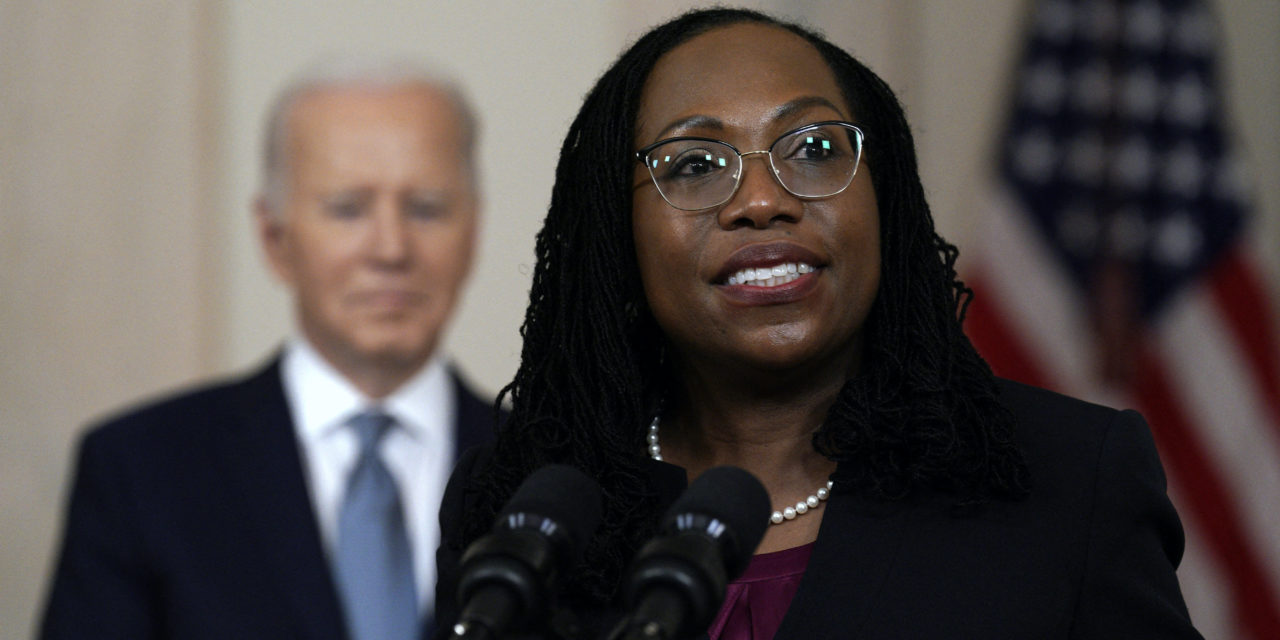The U.S. Senate Judiciary Committee has scheduled confirmation hearings to begin March 21 for President Joe Biden’s nominee to the U.S. Supreme Court, Judge Ketanji Brown Jackson of the U.S. Circuit Court of Appeals for the District of Columbia.
Judge Jackson, nominated on February 25 to replace the retiring Justice Stephen Breyer, will spend the time between now and March 21 making the rounds of Senate chambers, speaking with senators about her judicial philosophy and other matters. She has also filled out a comprehensive questionnaire from the Judiciary Committee that delves into her background, interests, significant legal work and judicial opinions, and many other areas.
We learned at the White House ceremony announcing her nomination that she is married to a surgeon and together they have two daughters. We also heard the basics of her education and job experience.
In the time since February 25, various groups have started examining her record, and information is starting to come in which gives us a better-informed picture of Judge Jackson.
So, what have we learned about her as a lawyer and judge that will help predict how she will perform as a Supreme Court justice?
Since Supreme Court confirmation hearings always end up focusing on the hot-button issue of abortion, let’s begin there.
As a judge on the DC Circuit for less than a year, Jackson has only authored one opinion, which did not concern abortion or other notable social issues. During her tenure as a federal district judge prior to that, however, she did rule in favor of Planned Parenthood (PP) and against the Trump administration in a case involving the U.S. Department of Health and Human Services (HHS) funding of its Teen Pregnancy Prevention Programs (TPPP).
PP was a beneficiary of taxpayer funds under TPPP, until HHS in 2018 attempted to move to a more abstinence-based or “sexual risk avoidance” program, which would have resulted in PP losing its taxpayer-funded payday. In the resulting lawsuit brought by PP, Judge Jackson restored funding to the program, ensuring that taxpayer funds continued flowing to the abortion giant.
In 2001, then-attorney Jackson helped co-author an amicus brief on behalf of pro-abortion groups in a Massachusetts case involving a state law that created “buffer zones” to keep pro-life protestors and sidewalk counselors from getting too close to women entering abortion facilities.
Jackson’s record on issues such as religious freedom, parental rights and other issues of importance to the family is thin. As a judge in the District of Columbia, she heard lots of cases involving government agencies, which are not always a fruitful source for understanding a judge’s philosophy concerning the First or 14th amendments, where many of today’s social issues land.
Even without much of a judicial paper trail, however, you can tell a lot from examining the list of organizations supporting Judge Jackson’s nomination. As Carrie Severino, the president of the Judicial Crisis Network notes at National Review’s “Bench Memos,” a laundry list of left-leaning groups have cheered Jackson’s nomination: Sierra Club, People for the American Way, the American Constitution Society, Alliance for Justice, Americans United for Separation of Church and State, Planned Parenthood, Black Lives Matter, and NARAL Pro-Choice America, among others.
The Senate Judiciary Committee hearings on Jackson will last four days, as is typical for Supreme Court nominees. Once finished, the committee will vote on a recommendation to the full Senate, which will than vote yea or nay on her nomination. Typically, 51 votes are necessary to confirm, but there has been speculation that in the evenly divided Senate chamber a 50-vote tie would allow Vice President Kamala Harris to cast the deciding vote in Jackson’s favor.
If confirmed, Jackson will replace Justice Breyer when he officially retires at the end of the current term of the Supreme Court in late June or early July.
Photo from Reuters.






